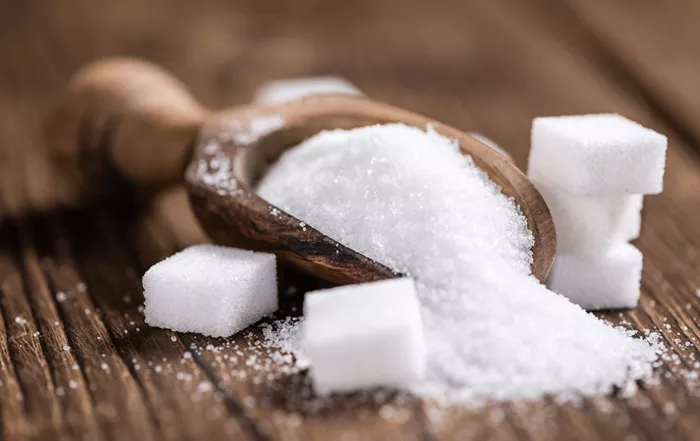Sugar and sugar alcohol are two common sweeteners found in many foods, but how do they compare when it comes to health? Both can be useful in certain situations, but excessive consumption of either may lead to unwanted side effects. Understanding their differences and health impacts can help you make more informed choices about what you eat.
What Is Sugar?
Sugar is a carbohydrate widely used in food and drinks for its sweetness, preservation, and fermentation properties. It is also found in various medicines. Sugars are divided into two main categories:
Monosaccharides: These include glucose, galactose, and fructose. For instance, glucose and fructose are found in fruits, while galactose is present in milk.
Disaccharides: These sugars are made up of two monosaccharides. For example, sucrose (table sugar) consists of glucose and fructose, while lactose is a combination of glucose and galactose.
Both naturally occurring and industrially produced sugars can contain monosaccharides and disaccharides. Honey, for example, is composed of about 75% monosaccharides and 15% disaccharides.
What Is Sugar Alcohol?
Sugar alcohols are sweeteners found naturally in small amounts in fruits and vegetables. These substances are also extracted and processed to create low-calorie sweeteners. Despite their name, sugar alcohols do not contain ethanol (the type of alcohol found in alcoholic drinks). There are seven main types of sugar alcohols:
- Xylitol
- Erythritol
- Maltitol
- Sorbitol
- Isomalt
- Lactitol
- Mannitol
Sugar alcohols are commonly used in sugar-free, diet, and diabetes-friendly products. They are also found in medicines and dental products like lozenges, chewable vitamins, and mouthwashes.
Key Differences Between Sugar and Sugar Alcohols
While both sugar and sugar alcohols serve as sweeteners, they have distinct differences:
Digestion and Absorption: The body only partially absorbs sugar alcohols. The unabsorbed portion is processed by bacteria in the colon, which can produce gas. This slower absorption process can lead to gastrointestinal issues, especially in larger amounts.
Calories: Sugar contains 4 calories per gram, while sugar alcohols provide fewer calories due to their partial absorption.
Taste: Some sugar alcohols leave an aftertaste, while others, like xylitol, taste very similar to sugar. Many sugar alcohols also cause a cooling sensation in the mouth.
Sweetness: Xylitol is as sweet as sugar, but other sugar alcohols tend to be less sweet.
Oral Health: Some sugar alcohols, like sorbitol and xylitol, are added to dental products because they may help reduce the bacteria that cause tooth decay.
Similarities Between Sugar and Sugar Alcohols
There are some notable similarities between sugar and sugar alcohols:
Natural Origins: Both are derived from natural sources like fruits and vegetables.
Health Concerns: Consuming too much of either sweetener can lead to health issues. The CDC recommends limiting added sugar intake to no more than 10% of daily calories due to its links to weight gain, diabetes, and heart disease. Excessive consumption of sugar alcohols can cause gastrointestinal discomfort, such as bloating, diarrhea, and stomach cramps.
Which Is Healthier?
Both sugar and sugar alcohols have potential health risks when consumed in large quantities. However, sugar alcohols may offer benefits for people with diabetes, as they don’t cause blood sugar spikes the way regular sugar does. Despite this, more research is needed to fully understand the long-term effects of sugar alcohol consumption, especially concerning its potential link to conditions like diabetes and cardiovascular disease.
It’s also important to note that not all sugar alcohol-containing products are suitable for diabetics, as they may still have high carbohydrate content. In some cases, sugar alcohols can lead to overeating because they are less sweet than sugar, potentially causing other adverse effects.
Risks and Considerations
Sugar alcohols can cause gastrointestinal issues like gas, diarrhea, and bloating, particularly in higher doses. Some people may experience these symptoms more intensely. Additionally, there is some evidence suggesting that consuming high amounts of sugar alcohols could increase the risk of cardiovascular problems, although natural amounts in whole foods are usually well-tolerated.
Too much added sugar, on the other hand, is linked to weight gain, obesity, and long-term conditions such as diabetes and heart disease.
Conclusion
Both sugar and sugar alcohols can be part of a healthy diet, but moderation is key. While sugar alcohols provide fewer calories and don’t cause blood sugar spikes, they may still cause gastrointestinal issues when overconsumed. As with all sweeteners, it is important to balance intake and be aware of how these ingredients affect your health.
Read more:
- How High Should My Blood Sugar Be After Eating?
- What Can You Eat When Your Sugar Is High?
- What Causes Sugar to Go Up?


